
Fotolia
10 sentiment analysis tools to consider
Sentiment analysis is a vital component in customer relations and customer experience. Several versatile sentiment analysis software tools are available to fill this growing need.
Sentiment analysis tools can help organizations go behind a customer's words and dig into their emotions -- a valuable asset to strengthen the customer experience.
Sentiment analysis is a rapidly growing branch of customer relationship management and the customer experience. This technology analyzes the customer's speech and text to detect not just their spoken concerns but the emotions behind them. Understanding these emotions and motivations is an essential step in crafting more effective responses to customers and enhancing their experiences overall.
How sentiment analysis works
Organizations can achieve sentiment analysis in a few ways. One method is to use sentiment analysis software to capture customer speech and text -- from service calls, emails, texts and other direct customer feedback -- and analyze that text and speech to detect the customer's feelings. Those emotions could cover considerable territory, from satisfaction to irritation to frustration to impatience. For a service agent or sales representative, knowing what's really going on with the customer is the first step to responding in the best way to improve the exchange and, by extension, the relationship.
Another application of sentiment analysis software is brand management, or the opinion mining of social media platforms such as Twitter and Facebook for social media posts. This social listening can indicate measures of positive or negative sentiment about the brand. This aggregated social media sentiment can become an informal barometer that informs the organization about where it stands in the market at a particular moment in time -- an invaluable resource for responding to market shifts.
Sentiment analysis software uses a form of AI called natural language processing, where large amounts of data (text and speech) are deeply analyzed for subtle patterns that surface important markers in human expression. Machine learning then generates a model that can recognize those markers in real time or across current, unstructured data. Put another way, the software can be "taught" what to "listen for" in a customer call or email or chatbot exchange that will make clear what the customer is feeling.
Organizations can also do sentiment analysis through a from-scratch, hands-on development effort. Analytics Vidhya, a data science community, recently studied Twitter customer sentiment about Pepsi and Coke using a home-grown R app, for instance.
There is a growing number of vendors offering sentiment analysis tools for a range of use cases. Here are 10 options.
1. Lexalytics
The cloud-based Lexalytics offering performs as most sentiment analysis software does: It uses natural language processing to parse a customer's message, then performs sentiment analysis on the result to uncover the customer's underlying intention. It has the added feature of building out a shareable report of the analysis, articulating the why of the customer's feeling as well as the how.
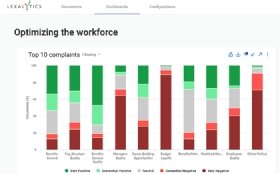
Lexalytics also plugs directly into Microsoft Excel, making it easy to pass results into other, more conventional reporting and analysis processes. Its sentiment accuracy is one of the highest in the market. An interesting feature is that the core model is so well-trained that it can understand poor grammar and slang language. A downside is that it is complex; it's not a turn-key product.
Pricing: On request (ballpark cost is $999 per month); a high-end, enterprise-level product.
2. Critical Mention
Critical Mention's sentiment analysis focuses on sentiment found not in social media posts, but in news articles and other online business sources -- including TV and on-air sources, a rare feature. This alerts the organization to changes in brand perception, not just from the sentiments of customers, but from those of business analysts and other industry observers. That information can provide a powerful perspective that would be of great strategic value in brand management.
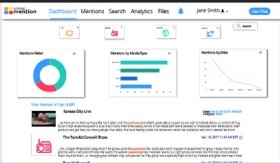
Critical Mention can even search video files and live broadcasts. Its high-quality graphic reporting is exceptional among products of its class. A downside is that the sentiment analysis tools are limited.
Pricing: On request (ballpark range is $29 per month to $99 per month); a good buy for smaller companies.
3. Talkwalker Quick Search
The sentiment analysis tool Quick Search is part of the larger suite Talkwalker, a full customer service platform. Quick Search is an integrated tool that aggregates mentions, likes, comments and other data that give insight into social media marketing efforts. Its results then feed into Talkwalker to generate actionable campaign decisions.
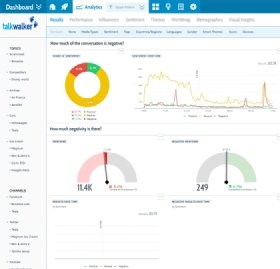
Quick Search has content ideation features, which can identify and track trends not only in brand mentions, but associated topics -- even emoji usage. It can also do brand image and video recognition. It can identify and track influencers and their mentions.
This is a high-end, enterprise-level platform; it's more than just a toolkit. Though it is useful for companies of various sizes, it only offers the image recognition capability at the enterprise tier.
Pricing: $9,600 per year for the Listening Plan; Analytics Plan pricing and Research Plan pricing on request.
4. Brandwatch
Brandwatch is another sentiment analysis tool that focuses on brand management. It's able to not only scan for text mentions of a brand online, but also for brand images, for instance, uses of the logo and other artwork associated with the brand. By tracking these appearances, it's possible to analyze how a brand performs with particular target audiences on social media.
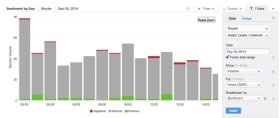
Many industry observers regard Brandwatch as the leading tool for parallel brand monitoring across all social media channels. Downsides include user-reported lag times for large queries and a lack of bulk data download.
Pricing: On request.
5. Social Searcher
Social Searcher is an inexpensive, social media-based toolkit that offers a simple up-or-down summary of positive sentiment and negative sentiment, based on entered keywords and hashtags. It breaks down its results by social media platform, apps and channels.
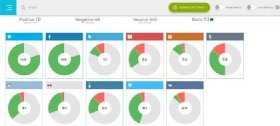
It also offers a social media monitoring API and real-time email alerts. Its downside is that its simplicity and limited functionality are only useful to smaller companies.
Pricing: Free to start; €3.49 per month for the Basic plan; €8.49 per month for the Standard plan, €19.49 per month for the Professional plan.
6. MonkeyLearn
MonkeyLearn's advantage is high customizability. Categorization tags can create specific categories of results that would be useful for customer experience improvement and brand management. The tool highlights sections of customer text according to those categories, making its results easy to parse. It can also generate custom word clouds from these tags.
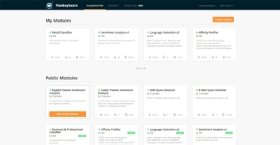
Other features include surveys as a customer text channel; its pretrained model integrates cleanly with ongoing, enterprise-specific learning. It is workflow-friendly, making its integration into other processes easier. It is also available as an API, as well as a tool suite. A downside is that users must enter data into the app via API or Google Sheets.
Pricing: API, $299 per month; software suite, on request.
7. Brand24
Brand24 does social listening, monitors for brand mentions and offers immediate notifications to enable real-time response. Plus, it tracks the rise and fall of sentiment in brand discussion over time to reveal customer sentiment trends.
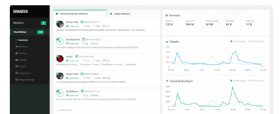
It is dashboard-driven, easy to read and integrates with Slack. A plus is that it assigns a "weight" to each influencer mention, making it clear which mentions to pay attention to. A downside is that some customers report the mobile implementation to be lacking.
Pricing: Free trial, then $49 per month to start, making it a good option for smaller companies.
8. Twinword Sentiment Analysis API
Twinword isn't a sentiment analysis software tool; it's an API that accepts text, performs analysis, then returns associations between the submitted words. Organizations can use the API with search engines, websites and custom applications. It is particularly useful in scenarios where it is desirable to connect a custom application to Twitter, for instance.
Behind the API is a constantly growing database that continuously learns from user activity across a vast range of sources. This setup results in a powerful core model that "understands" human language usage.
It is easy to use for an API, with a simple interface. Nonetheless, it is a highly technical offering that requires technical implementation.
Pricing: On request.
9. Text Sentiment Analysis Method API
Like Twinword, the Text Sentiment Analysis Method is an API, rather than a software toolkit. Customer or news source text can pass to it from an application, and it returns a full sentiment analysis report. The API uses the same natural language processing and machine learning methods as a software suite.
A downside is that, like Twinword, as an API it requires technical implementation.
Pricing: Free.
10. Text-Processing API
Another API, Text-Processing, is feature-rich, able not only to do sentiment analysis but also parts-of-speech summary. It can extract phrases from text to highlight them. Like Social Searcher, its core function is to score a text expression for positive sentiment or negative sentiment.
It also has stemming and lemmatization, or the capacity to truncate a word to its base unit.
Pricing: Free for Pro; $35 per month for Ultra; $75 per month for Mega.






